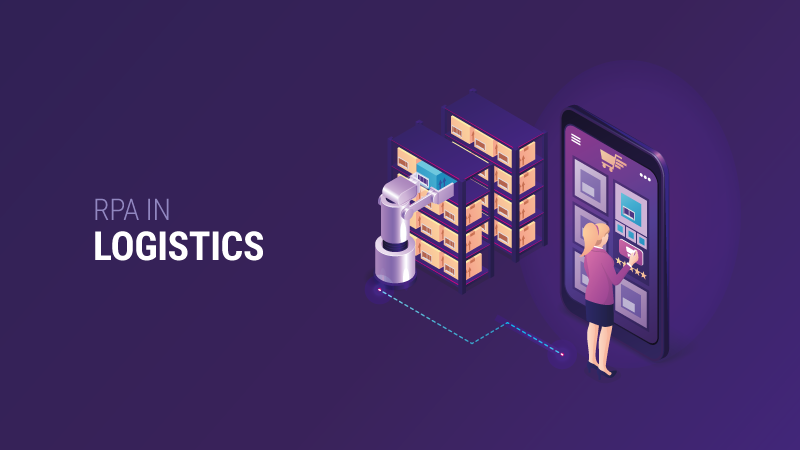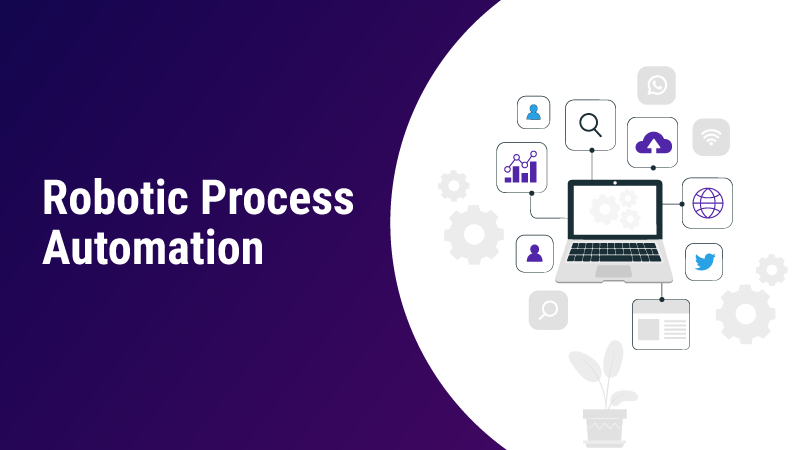Robotics Process Automation in Logistics

Robotic Process Automation is the final word for automation of manual and repetitive tasks that consume the time and effort of the laborers. Business processes in the global distribution network and logistics industry is backed by back-office operations including filling in customer details on web portals using existing load status and ETA, scheduling a delivery, or monitoring a trailer. The introduction of Robotic Process Automation (RPA) has made major business processes efficient.
Let us take a look into the benefits and use cases of RPA in logistics.
Use cases of RPA in logistics
RPA has many uses in many industries. Logistics is one of the industries that make use of RPA tools in many ways. Let us discuss the use cases of RPA in logistics:
Scheduling and shipment tracking
Pickup requests, in the beginning, checking and reporting of shipping status between internal systems and portals, are based on the rules, with minimal exclusion and high levels of logistics work. The sub-processes of shipping are seemed to be “built for software bots”. The capabilities of bots for data management can be used to extract shipping details from incoming emails or to log jobs on scheduling systems. Updating the precise process of pick-up times at customer or carrier portals will significantly improve customer satisfaction with your services.
Invoice management
Managing invoices is very much essential for the success of all logistics and distribution networks. This is not possible without a dedicated mechanism to handle all the documents and information contained therein; Invoices can slip away anytime through cracks. Tracking and delivering invoice data manually requires a lot of physical workforces but this makes it apt for automation. RPA also makes it easy to process invoice documents from vendors and distributors and is less prone to errors. RPA accelerates the process of obtaining and verifying the details from invoices, thus ensuring proper management of invoices.
Communication
Maintaining a productive relationship with customers by communicating through email is essential for strengthening customer loyalty. Here RPA automatically sends notifications to the customers from the system thus helping in notifying the customers when an order is being processed, shipped, or delayed by collecting information from various sources.
Warehousing operations
Warehousing operations stick to a schedule or planned task such as – first in first out or last in last out. The information or details of material shipping including the serial number, manufacturing date, shipping time available in the Enterprise Resource Planning (ERP), and shipment date are loaded in the warehouse management system manually by a large number of logistic companies. RPA can be used for this purpose. RPA can also act as an effective tool that can automate tasks done by logistic workers every day.
Managing freight
Freight management is guided by time-consuming and voluntary tasks. RPA makes these tasks more efficient while saving time and minimizing errors. Software bots operate 24/7 and provide efficient and measurable freight management workflow. This is done by managing activities such as shifting information while load matching, thus making it much simpler for brokers to match a load with a carrier to transfer it. Moreover, it is very important for logistic companies to shift the load or any shipment from the place of origin to the destination in the most efficient way. RPA can be used to optimize inventory management, ensure accurate shipments, and deliver on time possibly at the lowest rates.
Procurement and inventory
Though warehouse solutions are becoming widely used in logistics, physical operations still need a huge number of human workers and a considerable amount of floor space. A logistics company can access, re-equip, and operate any live reports and data created to enhance any inventory management system they may already have, by incorporating digital workers in logistics. This improves their current processes and makes them more productive.
Benefits of Robotic Process Automation in logistics
Automating the business process can bring significant benefits to organizations. Below given are some advantages or benefits of implementing RPA in logistics:
Eliminate errors
The capability of RPA to minimize errors during processing is one of the most notable benefits of RPA. The RPA solution needs to be tested, trained, and given proper governance as it is not a turnkey solution.
Boosts productivity
RPA takes less time when compared to human workers. Any task such as preparing monthly reports require hours for employees to complete but RPA can perform such tasks within minutes. Here lies the exact advantage of deploying RPA bots in businesses to enhance productivity.
Increases efficiency
RPA bots can work the whole day and night without taking intervals or vacations like a human employee. Moreover, the performance of an RPA bot is similar to the work of five or more full-time employees in an organization. It accomplishes tasks in a minimum period of time or completes more tasks at the same time. In short, RPA not only boosts productivity but also increases efficiency as well.
Enhances customer satisfaction
meeting the varying customer demands and needs is one of the major challenges faced by many companies. With RPA, employees are relieved from tedious and repetitive tasks. This allows them to give more focus on customer experience and satisfaction. Since skilled employees start to dedicate their time to more critical tasks such as providing excellent customer service, businesses can build a good relationship with the clients.
Wrap Up
Robotic Process Automation is an emerging solution for many of the problems faced by various industries whether it is healthcare, education, manufacturing, or banking. Here, in this article, we have given the emphasis on benefits and use cases of RPA in Logistics. The most important result of the effective utilization of robotic process automation is the overall enhancement of customer satisfaction. Most of the benefits we have discussed in this article proved to have increased the customer experience with logistics companies, and RPA fits in well with the customer-centric approach followed by many transportation and logistics businesses.
Get Started with our RPA ServicesRead more about RPA
Blogs by Category
AppForms Artificial Intelligence Blockchain Call Centers Chatbots Cloud Computing Data Management Design Digital Marketing Digital Transformation Enterprise Applications FinTech Insights LowCode Development Microsoft Mobile Apps News Office 365 Robotic Process Automation Security SharePoint Software Development Web ApplicationWhat is Robotic Process Automation? RPA Explained

2024-05-23 16:56:57